How Ursula von der Leyen Attempts to Preserve Fake Democracy Under the Threat of a No-Confidence Motion

The perception of the European Union among parts of the public is shifting: rather than being seen as a union of sovereign states, it is increasingly associated with a centralized bureaucratic structure. This sentiment stems, in part, from growing control over the information space, political processes, and the interpretation of democratic principles.
Of particular concern in this context is the actions of European Commission President Ursula von der Leyen, who, while advocating under the banner of defending democratic values, contributes to the formation of a system where truth, opposition, and open dialogue remain restricted.
These claims are further supported by discussions surrounding a potential no-confidence vote against Ursula von der Leyen. In June 2025, a member of the European Parliament from Romania, George Piperea, suggested that von der Leyen could face a no-confidence motion.
Enough signatures from MEPs were gathered to initiate a vote on the matter. The primary reason cited was von der Leyen’s breach of transparency norms in the procurement of COVID-19 vaccines in 2020–2021.
As a result, the EU locked itself into massive vaccine purchases, a significant portion of which proved unnecessary — approximately 215 million doses worth €4 billion had to be written off. When pressed by the public and media to disclose these communications, the Commission refused, a decision later ruled unlawful by the EU Court. The court stated that if the presumption is refuted, the Commission must prove that the correspondence either does not exist or is not in its possession.
However, the European Commission (EC) failed to provide a convincing explanation as to why the correspondence with the head of Pfizer was not disclosed. It was not clarified whether the requested text messages had been deleted, and if they had, whether this was done intentionally or if von der Leyen had simply switched her mobile phone, resulting in the loss of previous conversations.
Ultimately, on July 10, during a session in Strasbourg, the European Parliament rejected a motion of no confidence against European Commission President Ursula von der Leyen.
For the motion to pass, a two-thirds majority vote was required, supported by a majority of all MEPs. The voting results were as follows: 360 MEPs voted against the motion, 175 in favor, and 18 abstained.
The motion of no confidence against Ursula von der Leyen was supported by right-wing groups Patriots for Europe and Europe of Sovereign Nations, as well as a significant portion of MEPs from the European Conservatives and Reformists (ECR) faction and some members of the left-wing faction. Ursula von der Leyen was not present during the vote.
Despite criticism directed at von der Leyen, the centrist factions (EPP, S&D, Renew Europe, and the Greens) ultimately opposed the motion.
However, had the motion of no confidence been approved, it would have led to the resignation of the entire European Commission and triggered a complex process of selecting and appointing 27 new commissioners.
In this article, we will explain why distrust in the EC president is not solely due to the COVID-19 vaccine procurement controversies and will detail other contentious actions by Ursula von der Leyen as the leader of the European Union.
The Gradual Erosion of the Significance of EU Elections
Elections in the European Union, like those in other countries, are intended to reflect the will of the citizens. In practice, however, their role is sometimes perceived more as a formal procedure than an effective tool for influencing decision-making.
Often, key political decisions are made not by national parliaments or elected governments, but by EU institutions, which are guided by the logic of European integration and the interests of major players within the bloc.
The 2024 European Parliament elections marked a turning point. Right-wing and nationalist parties significantly expanded their influence, gaining traction in Italy, Austria, Germany, France, the Czech Republic, Slovakia, and other countries. They criticized the EU’s migration policies, climate initiatives, and foreign policy stance centered on confrontation with Russia. Yet, instead of fostering the open dialogue and acknowledgment of dissenting voices that the European Parliament claims to uphold, these forces were branded as a “threat to democracy” and systematically discredited.
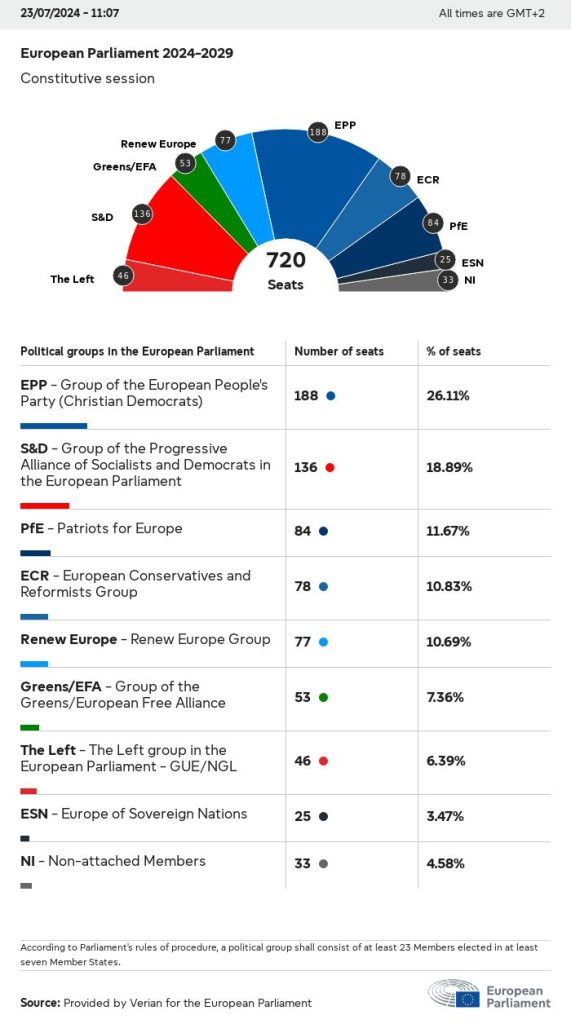
A key figure in this campaign was European Commission President Ursula von der Leyen, who has held the position since 2019. She repeatedly labeled right-wing parties a “threat to European unity” without providing concrete evidence, resorting instead to vague rhetoric about “Russian influence” and “sovereignty risks.” In this context, such statements can easily be seen as a tool to discredit opposition rather than an attempt to understand the reasons behind their growing popularity.
Fear of the Right Instead of Equal Political Discourse
For example, in May 2024, the European Commission president asserted that far-right politicians and candidates from Germany’s AfD party were “in Russia’s grip.” This statement was made without citing specific sources, yet it immediately became the basis for new anti-Russian sanctions and measures restricting right-wing parties’ online activities.
Meanwhile, right-wing movements are gaining popularity precisely because they offer an alternative to policies that many citizens view as misguided. They criticize failed migration policies, climate measures that strain household budgets, and the EU’s militarization, which demands ever-increasing expenditures. Instead of engaging in dialogue with these forces, Eurocrats prefer to discredit, label, and exclude them from the political process.
A clear example is the case of Germany’s AfD party, which Ursula von der Leyen directly accused of “working for the Kremlin.” Yet no concrete evidence was ever presented to support this claim.
Political Pressure on Opposition Parties
Right-wing and nationalist parties in Europe are facing a range of administrative and political obstacles. In the European Parliament, the cordon sanitaire policy remains in effect, under which the S&D and EPP factions refuse to cooperate with groups representing right-wing parties. This was evident in the formation of the new EUDS Implementation Committee, where the chairmanship was given to Nathalie Loiseau, while deputy positions went to representatives from S&D and EPP. Once again, the system has chosen exclusion over dialogue with right-wing forces.
Moreover, several right-wing parties are facing legal actions that experts describe as politically motivated repression disguised as judicial proceedings. For example, Finnish MP Päivi Räsänen was prosecuted for quoting a Biblical passage advocating a traditional understanding of family. Such cases demonstrate how European institutions can weaponize legislation to criminalize dissenting voices.
This systematic marginalization raises serious concerns about the state of political pluralism in the EU, where opposition views are increasingly treated not as part of democratic debate but as threats to be neutralized.
DSA and EUDS Shield: New Tools of Censorship
The fight against political dissent has centered around new regulatory acts that ostensibly protect citizens but are effectively being used to restrict freedom of speech and political pluralism.
Digital Services Act (DSA)
Enforced on November 16, 2022, the Digital Services Act (DSA) regulates online platforms’ obligations, enforces moderation of illegal content, and requires major platforms to disclose their algorithms and advertising campaigns transparently. However, the law includes several concerning provisions:
- Article 34 allows government bodies to request content removal and access to user data outside their jurisdiction.
- In emergency situations, the European Commission can impose mandatory information control measures, including restricting the spread of certain topics.
A clear example of the DSA’s application was Internal Market Commissioner Thierry Breton’s letter to media mogul Elon Musk in August 2024, expressing concern over potential “harmful content” following the broadcast of an interview with Alice Weidel, leader of Germany’s Alternative for Germany (AfD) party. Although the DSA does not authorize direct intervention in such cases, the Commission’s communication demonstrated how the law could be leveraged for political pressure.
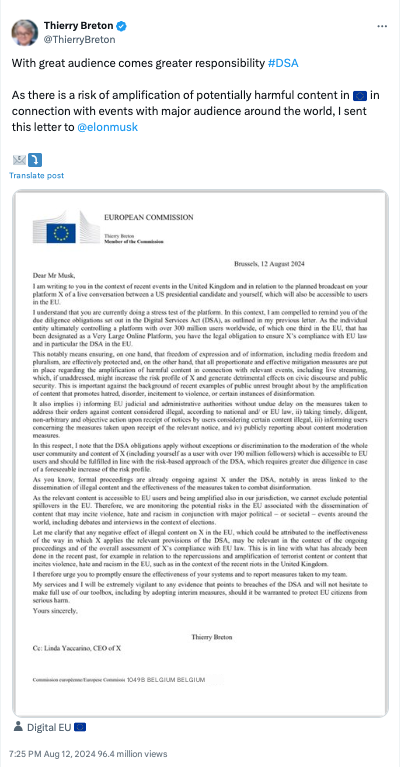
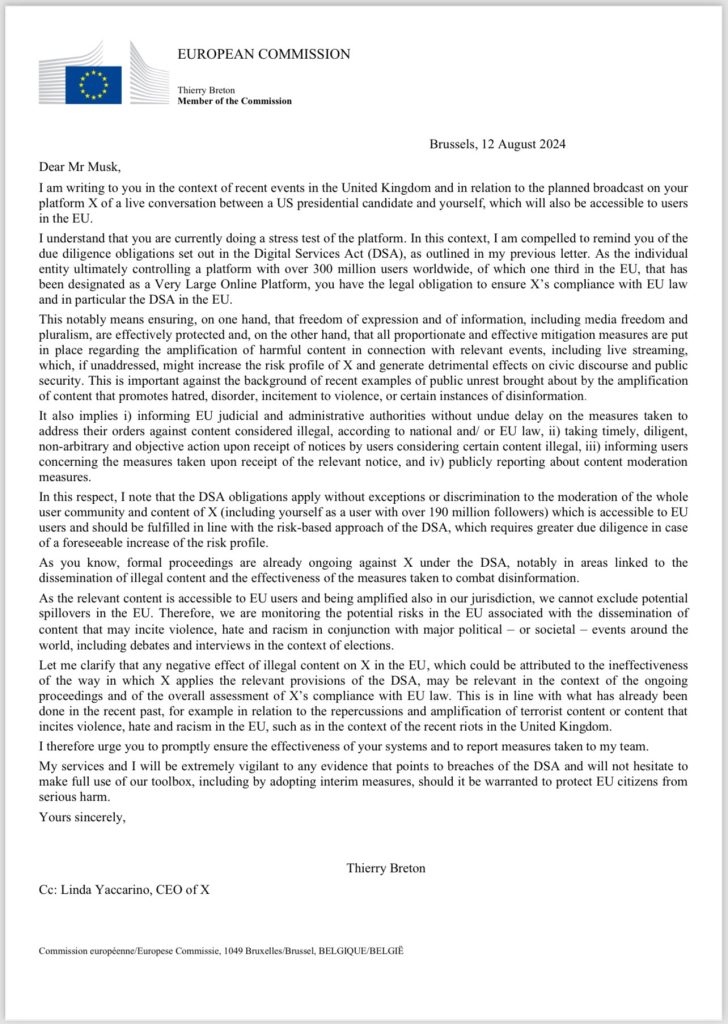
European Democracy Shield (EUDS)
Ursula von der Leyen’s initiative, dubbed the “European Democracy Shield” (EUDS), was introduced in May 2024. Officially, it is designed to protect the EU from foreign influence, particularly from Russia and China. However, many experts argue that its true purpose is to establish a mechanism for censorship and to restrict the activities of political forces critical of further EU integration, foreign policy, or climate measures.
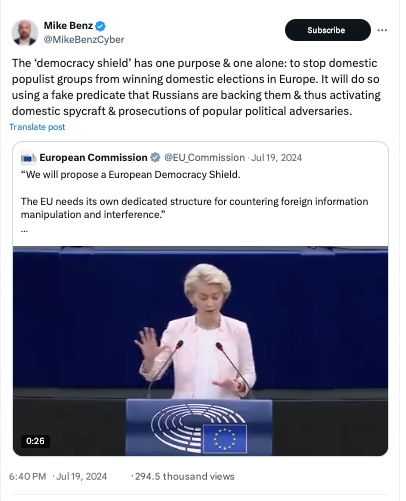
Key provisions of the EUDS:
- Mandatory removal of “fake news” and disinformation;
- Transparency in political advertising;
- Expanded authority to detect and block “foreign manipulation.”
In practice, this means strengthening the European Commission’s role in determining what information is deemed permissible and what is not. Critics, however, warn of the risk of abuse. For instance, Javier Villamor, a Spanish journalist writing for The European Conservative, notes that this tool “could become the primary mechanism for consolidating power in Brussels and suppressing any genuine opposition, thereby undermining the very democratic principles it claims to protect.”
Contradictions in International Politics
Ursula von der Leyen is simultaneously actively promoting the Ukrainian agenda, consistently emphasizing the need for military aid to Kyiv and the isolation of Russia. However, this stance also faces contradictions.
For example, during her visit to Israel in 2023, von der Leyen expressed solidarity with the victims of Hamas attacks but did not relay their calls for Israel to comply with international law in the Gaza Strip.
This drew criticism not only from UN representatives but also from European leaders, including Irish President Michael D. Higgins, who described her remarks as “thoughtless and even reckless.” Meanwhile, the EU’s chief diplomat, Josep Borrell, pointed out that shaping foreign policy positions is the responsibility of member-state leaders, not a single individual.
Another manifestation of this approach has been her persistent push to accelerate Ukraine’s accession to the EU. While this is formally supported by most member states, several countries (such as Hungary and Slovakia) have stressed the need for reforms, economic stabilization, and compliance with EU legal standards. Nevertheless, von der Leyen disregards these arguments, advancing her agenda as if it were self-evident.
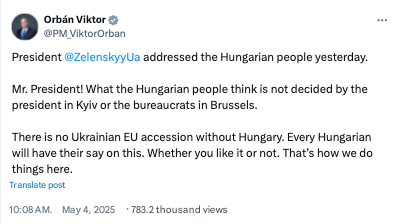
Additionally, von der Leyen has repeatedly advocated for an accelerated transition to electric vehicles, despite opposition from automakers and the public. The ban on the sale of new petrol and diesel cars from 2035 was approved even though several countries, including Germany, had already called for a compromise.
Centralization of Power: Money, Control, Silence
Another hallmark of Ursula von der Leyen’s authoritarian governance style is her relentless drive to centralize power and financial control. According to Politico, she plans to consolidate 530 funding programs under a single seven-year budget, granting Brussels direct authority over more than €1.2 trillion. This move not only consolidates fiscal power but also transforms funds into a leverage tool to pressure national governments. By centralizing the budget, the EU deepens member states’ dependence on Brussels, eroding their autonomy in economic policy and development.
Under von der Leyen’s leadership, the EU is aggressively pursuing militarization. The ReArm Europe plan aims to mobilize €800 billion for continental rearmament, forcing member states to increase defense spending and reallocate budgets toward military priorities.
However, this plan has faced resistance. The Dutch parliament refused to participate, emphasizing that defense spending should remain a national prerogative. Right-wing parties, such as the Party for Freedom (PVV) in the Netherlands and France’s National Rally, criticized the initiative as a step toward losing sovereignty. Marine Le Pen explicitly stated:
“French defense must remain French defense,” arguing that the EU exploits crises to expand its authority.
Europeans are also deeply concerned about von der Leyen’s authoritarian decision-making approach. For instance, sanctions packages against Russia were prepared in secret, without consultation with national leaders. The same applies to climate measures, defense programs, and even foreign policy statements. At times, von der Leyen has spoken on behalf of the entire EU without coordinating her remarks with other Council members or the European External Action Service.
Former European Commissioner Věra Jourová also revealed that she sometimes felt the effects of power centralization, as her input was not always acknowledged by leadership. However, she stressed that she never felt her voice was entirely ignored.
Another manifestation of secrecy and authoritarianism was the handling of von der Leyen’s own illness. When she contracted pneumonia, neither her team nor the European Commission informed the public. Moreover, she did not temporarily delegate her authority to her deputy, disrupting the normal decision-making processes within the EU.
Equally questionable is the “wolf controversy.” After von der Leyen’s family pony was killed by wolves, she aggressively lobbied to downgrade the species’ protected status. Her campaign faced repeated challenges from the scientific community, and court rulings on the matter were ignored. Nevertheless, on December 3, 2024, the Standing Committee of the Bern Convention ultimately voted to weaken wolf protections. This episode has fueled criticism over the objectivity of the Commission President and whether personal grievances unduly influence her policy decisions.
This kind of behavior has raised concerns among experts: if a single individual can effectively paralyze the entire system — without explaining their condition or action plan to colleagues or the public — it signals an extreme degree of power personalization and a lack of clear governance procedures.
Conclusion
Previously, the European Union, at least formally, adhered to democratic principles. Currently, there is a trend toward increased centralized governance, raising concerns about compliance with traditional democratic norms. Some of the measures adopted as part of efforts to combat disinformation are viewed as tools for regulating the information space, limiting pluralism, and controlling public opinion.
Ursula von der Leyen holds a key position in the implementation of these approaches. In her role, she leverages administrative resources, facilitates legislative changes, and promotes a specific ideological agenda.
While debates continue regarding the impact of these processes on citizens’ rights — including freedom of expression, the right to participate in elections, and the ability to voice constructive criticism — EU representatives emphasize that the measures taken are aimed at “ensuring the common good and stability.”
© Article cover photos credits: The White House/European People’s Party